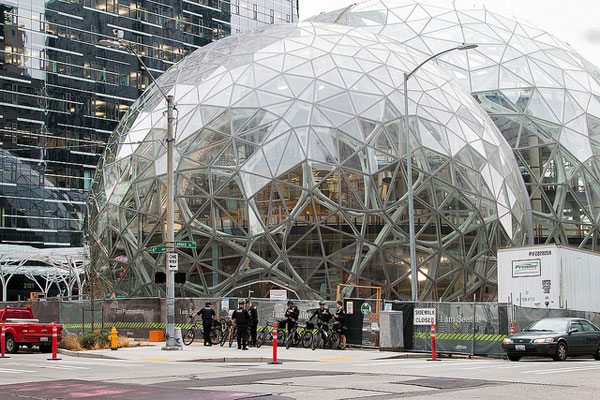
April 23, 2018; Atlanta Business Journal
The ongoing drama surrounding Amazon’s search for HQ2 has taken an interesting turn in the nation’s capital region. Of the 20 finalists for the online giant’s second headquarters, three are in the capital area, and they are thinking of working together to make their bids more attractive.
Washington D.C., Northern Virginia, and Montgomery County are finalists for HQ2, a decision likely influenced by the potential for a bidding war. The possibility is so likely that a number of economists and urban development experts wrote an open letter asking for municipalities to avoid a bidding war. In a competition to win the next location, municipalities might be tempted to make a number of tax-based concessions, or in some cases, cash concessions to Amazon.
Will the trifecta pool resources to make themselves a more attractive bid or will the trio engage in fierce competition, bidding away any potential gains of the corporation moving to the area? Economics predicts the latter. The late economist Gordon Tullock predicted that firms will spend as much money lobbying to gain a contract as the contract is worth. This is analogous to municipalities bidding for the new HQ2. In pursuit of the gains from the new HQ2, it makes sense to concede as much money as would be gained from having the base in region. The trouble is, it is difficult to know exactly how much value HQ2 will bring. (This is known as the winner’s curse.)
Now, assuming that a municipality wins HQ2 and wins it without giving up too much, there are no guarantees that a sweet deal will make a corporation stay. Just ask Indiana.
Sign up for our free newsletters
Subscribe to NPQ's newsletters to have our top stories delivered directly to your inbox.
By signing up, you agree to our privacy policy and terms of use, and to receive messages from NPQ and our partners.
Given all of that, and the potential for investment elsewhere in the local economy, why would a city want the new Amazon headquarters? To be sure, there will certainly be externalities and spillover effects. Having a company such as Amazon in the area will attract a highly skilled labor force, which tends to be good for local prospects. Another potential externality, especially in this case, is the mutual cooperation of municipalities in the same area. Joint investment in efficiency enhancing infrastructure could be a boon for the collective region.
It remains to be seen if D.C., Northern Virginia, and Montgomery County will work together and, more importantly, whether the trio will work together to find a bid more palatable to its residents. It certainly seems unlikely. D.C.’s deputy mayor for planning and economic development put it:
“We feel like it is a benefit for the entire region if they come anywhere in the region,” Kenner said. “That does not preclude that we each have our own competitive advantages, and we want to make sure that Amazon knows, sort of, effectively the best foot forward for Washington, D.C., specifically.”
Amazon’s search for HQ2 is a case study in collateral damage. Some cities are examining transparency within city government. Other areas, as Rob Meiksins discusses in his newswire, are exploring ways of spurring growth through local startups with the help of native nonprofits. Hopefully, city governments can learn from this experience and implement wise policies that will not rely on the influx of a white whale corporation to spark growth.—Sean Watterson











